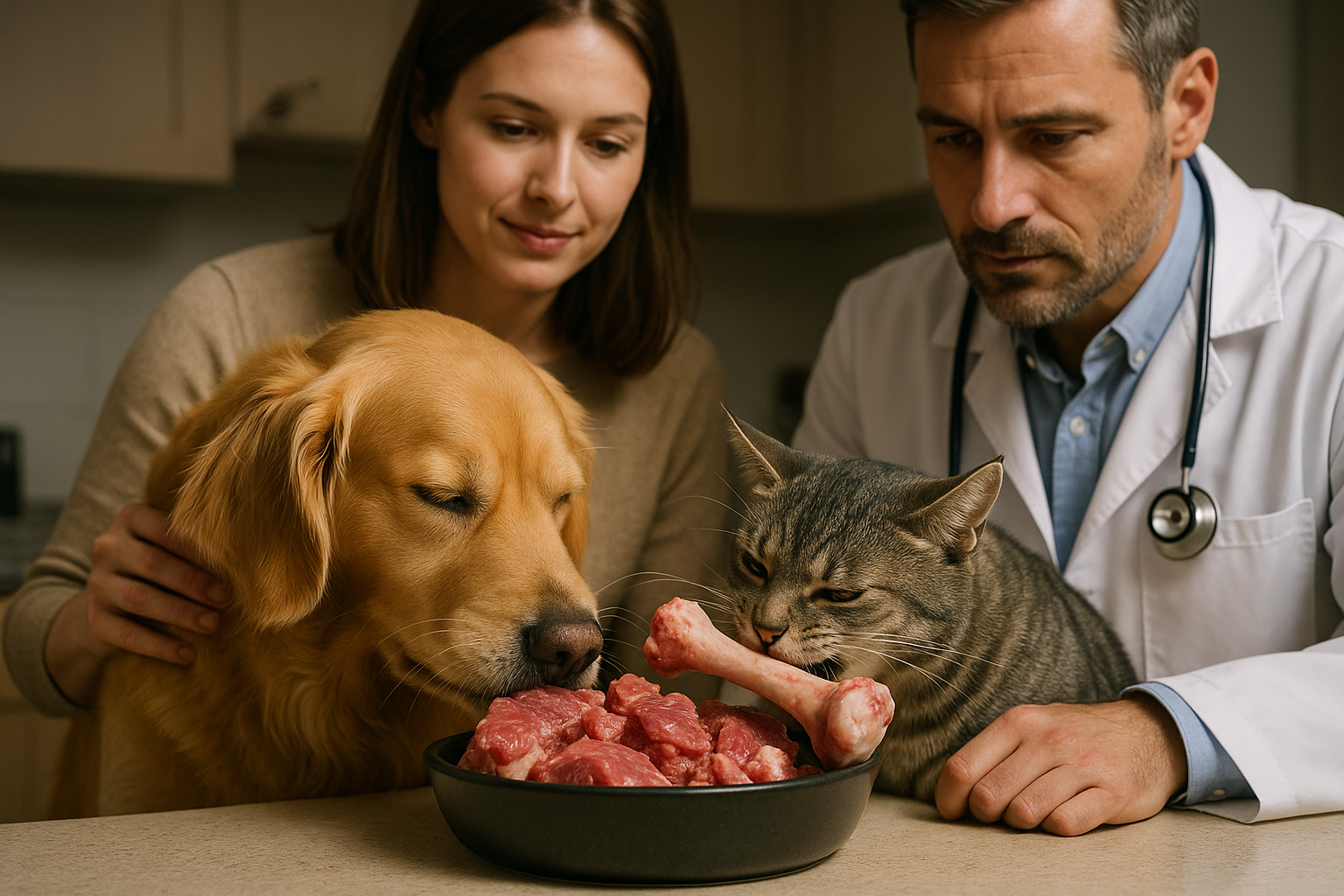Discover Which Common Human Foods Are Harmful to Cats in the United States
Cats have unique dietary needs, and many common human foods can be harmful or even fatal to them. This article outlines which foods to avoid, explains the health risks they pose, and helps cat owners in the United States recognize signs of poisoning for safer pet care.

Why Certain Human Foods Are Dangerous to Cats
Cats are obligate carnivores, meaning their bodies require nutrients found exclusively in animal products. Their digestive systems are not equipped to process many plant-based or processed foods that humans consume daily. Moreover, cats are smaller and metabolize substances differently, increasing their sensitivity to specific toxins.
Feed your cat a well-balanced diet formulated specifically to meet their nutritional needs and avoid offering human foods known to be toxic. Even small amounts of dangerous foods can cause serious health problems.
Toxic Foods to Avoid Feeding Your Cat
Onions, Garlic, and Chives: Red Blood Cell Destroyers
Onions, garlic, and chives in all forms—raw, cooked, powdered, or dehydrated—are highly toxic to cats. These foods contain compounds that damage feline red blood cells, causing hemolytic anemia, a serious health condition. Garlic is even more potent than onions in causing damage.
- Sources to avoid: Raw onions, cooked onion dishes, onion powder (sometimes found in baby foods), garlic cloves, garlic powder, chive seasoning.
- Symptoms of poisoning: Weakness, lethargy, pale gums, rapid breathing, jaundice.
- What to do: Seek veterinary care if ingestion is suspected.
Chocolate and Caffeine: Nervous System Stimulants with Potential Risks
Chocolate contains theobromine and caffeine, two substances toxic to cats. Dark chocolate and baking chocolate have the highest concentrations, making them particularly concerning. Caffeine—found in coffee, tea, colas, energy drinks, and some medications—is also toxic.
- Effects: Vomiting, diarrhea, tremors, seizures, abnormal heart rhythms.
- Note: Cats have limited ability to metabolize these compounds.
- Action: Prevent access to all forms of chocolate and caffeinated products; consult a veterinarian if ingestion occurs.
Alcohol and Yeast Dough: Rapid Absorption and Health Concerns
Alcoholic beverages and foods containing alcohol can cause intoxication in cats, even with minimal doses. Symptoms include vomiting, diarrhea, difficulty breathing, and in severe cases, coma.
Similarly, yeast dough can expand in the stomach and ferment into alcohol, causing bloating and potentially serious digestive complications.
- Warning signs: Abdominal swelling, vomiting, lack of coordination, unconsciousness.
- Emergency: Seek veterinary attention if your cat consumes yeast dough or alcohol.
Raw Meat, Raw Eggs, and Raw Fish: Infection and Nutritional Considerations
While cats are carnivores, raw meat, fish, and eggs can pose health risks:
- Bacterial contamination: Raw meats and eggs may harbor Salmonella and E. coli, leading to illness.
- Egg enzyme risk: Raw eggs contain avidin, which may interfere with biotin absorption and affect skin and coat health.
- Raw fish dangers: Certain enzymes in raw fish can reduce thiamine (Vitamin B1), important for neurological function. Deficiency can lead to seizures.
- Prevention: Feeding properly cooked meat and eggs reduces these risks.
Grapes and Raisins: Potential Kidney Health Concerns
It is advisable to keep these foods away from cats.
- Storage tip: Keep grapes and raisins inaccessible to pets.
Dairy Products: Common Lactose Intolerance and Digestive Effects
Many cats lack the enzyme lactase necessary to digest lactose found in milk and other dairy products, which can cause gastrointestinal upset.
- Common dairy items: Milk, cheese, cream, yogurt.
- Best practice: Offer fresh water instead of dairy products.
Bones and Fatty Table Scraps: Physical and Metabolic Considerations
Feeding bones to cats can cause choking, mouth injuries, constipation, or intestinal blockages. Excessive fat from table scraps may lead to pancreatitis, an inflammation of the pancreas.
- Symptoms of pancreatitis: Vomiting, diarrhea, abdominal pain, lethargy.
- Advice: Avoid giving bones or fatty scraps to cats.
Xylitol and Artificial Sweeteners: Potential Risks
Xylitol, a sugar substitute found in sugar-free gum, candies, and some peanut butters, is known to be highly toxic to dogs; its effect on cats is less clear. To be cautious, keep xylitol-containing products away from cats.
- Reason for caution: Possible hypoglycemia or liver damage.
- Recommendation: Avoid feeding products with artificial sweeteners to cats.
Human Medications and Household Items: Common Causes of Poisoning
Many human medications such as acetaminophen and ibuprofen can be harmful or fatal to cats. Household items like baking soda and baking powder can cause electrolyte imbalances and other serious health issues.
- Precaution: Store medicines safely out of reach of pets.
- If ingestion occurs: Contact a veterinarian immediately.
Tuna: Occasional Treats Only
Cats may enjoy tuna; however, feeding it regularly is not recommended. Human-prepared tuna lacks certain nutrients essential for cats and can contribute to nutritional imbalance. Excessive tuna intake could also lead to mercury exposure.
- Safe practice: Offer cooked tuna occasionally as a treat, not as a main diet component.
Emergency Response and Prevention Tips
- Monitor your cat when introducing new foods or treats.
- Keep toxic foods and harmful substances out of reach.
- Secure pantry items, medications, and garbage with pet-proof locks.
- Have emergency contacts ready: your veterinarian, nearest 24-hour animal hospital, and the ASPCA Animal Poison Control Center (888-426-4435).
- If you suspect your cat has consumed a toxic substance, note the amount and timing, and seek professional assistance promptly.
Conclusion
Being informed about foods that may be harmful to cats can contribute to their health and safety. Avoiding items such as onions, garlic, chocolate, caffeine, alcohol, raw animal products, grapes, dairy, bones, xylitol, and human medications is important for responsible pet care. Prioritize feeding your cat a balanced diet recommended by veterinarians and limit sharing human food that may pose risks. Understanding these factors can help maintain a safe environment for your feline companion.
Sources
- ASPCA: People Foods to Avoid Feeding Your Pets
- WebMD: Foods Your Cat Should Never Eat
- PetPlace: The Ultimate Guide to What Cats Can’t Eat
Disclaimer: All content, including text, graphics, images and information, contained on or available through this web site is for general information purposes only. The information and materials contained in these pages and the terms, conditions and descriptions that appear, are subject to change without notice.




